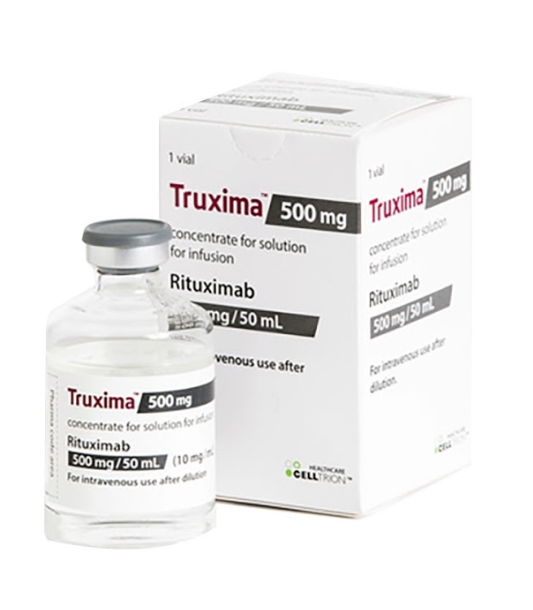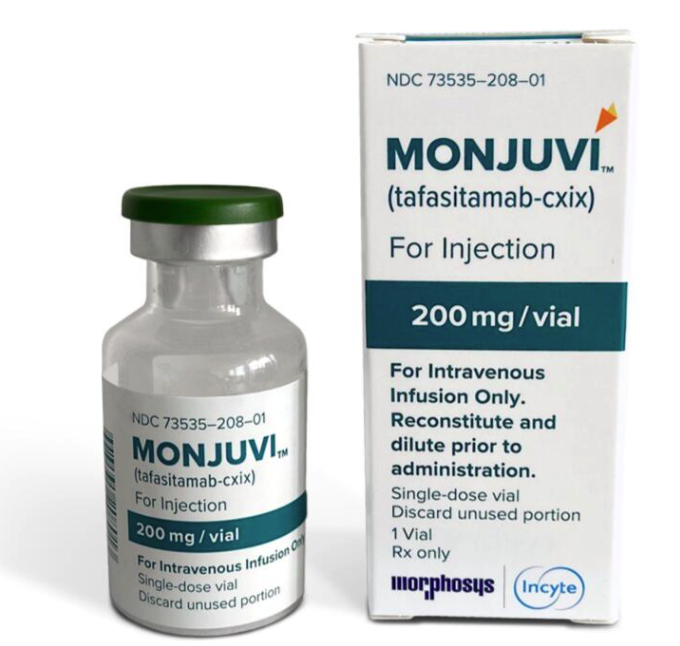Truxima (rituximab) vs Monjuvi (tafasitamab-cxix)
Truxima (rituximab) vs Monjuvi (tafasitamab-cxix)
Truxima (rituximab) is a CD20-directed cytolytic antibody that is used to treat various types of blood cancers, including non-Hodgkin's lymphoma and chronic lymphocytic leukemia, as well as autoimmune diseases like rheumatoid arthritis. Monjuvi (tafasitamab-cxix), on the other hand, is a CD19-directed cytolytic antibody indicated for the treatment of adult patients with relapsed or refractory diffuse large B-cell lymphoma (DLBCL), often in combination with lenalidomide, after at least two previous lines of systemic therapy. When deciding between the two, it is crucial to consider the specific type and stage of cancer, previous treatments, and potential side effects, as well as consulting with a healthcare professional to determine the most appropriate and individualized treatment plan.
Difference between Truxima and Monjuvi
| Metric | Truxima (rituximab) | Monjuvi (tafasitamab-cxix) |
|---|---|---|
| Generic name | Rituximab | Tafasitamab-cxix |
| Indications | Non-Hodgkin's lymphoma, chronic lymphocytic leukemia, rheumatoid arthritis, granulomatosis with polyangiitis, microscopic polyangiitis | Relapsed or refractory diffuse large B-cell lymphoma |
| Mechanism of action | CD20-directed cytolytic antibody | CD19-directed cytolytic antibody |
| Brand names | Truxima, Rituxan, MabThera | Monjuvi |
| Administrative route | Intravenous infusion | Intravenous infusion |
| Side effects | Infusion reactions, fever, lymphopenia, chills, infection | Fatigue, diarrhea, cough, fever, edema |
| Contraindications | Severe infections, severe immunodeficiency, hypersensitivity to rituximab or murine proteins | Hypersensitivity to tafasitamab-cxix or any of its excipients |
| Drug class | Monoclonal antibody | Monoclonal antibody |
| Manufacturer | Celltrion Healthcare, Genentech, Biogen | MorphoSys and Incyte |
Efficacy
Truxima (rituximab) Efficacy in Lymphoma
Truxima, a biosimilar to the original rituximab, is a monoclonal antibody that targets the CD20 antigen on the surface of pre-B and mature B lymphocytes. It is used in the treatment of non-Hodgkin lymphoma (NHL) and is effective in inducing remission in several types of B-cell lymphomas, including follicular lymphoma and diffuse large B-cell lymphoma (DLBCL). Clinical trials have demonstrated that rituximab, when used in combination with chemotherapy, improves overall survival and progression-free survival in patients with these types of lymphoma. The efficacy of Truxima is considered to be similar to that of the reference product, rituximab, based on comparative clinical studies that show no clinically meaningful differences in terms of safety, purity, and potency.
Monjuvi (tafasitamab-cxix) Efficacy in Lymphoma
Monjuvi (tafasitamab-cxix) is a monoclonal antibody that targets CD19, another antigen found on the surface of B cells. It is approved for use in combination with lenalidomide for the treatment of adult patients with relapsed or refractory diffuse large B-cell lymphoma (DLBCL) who are not eligible for autologous stem cell transplant. The efficacy of Monjuvi was evaluated in a multicenter, single-arm trial that demonstrated a significant response rate in patients with relapsed or refractory DLBCL. Patients treated with tafasitamab-cxix and lenalidomide showed a meaningful improvement in overall response rate (ORR) and complete response (CR) rates compared to historical controls of patients treated with other regimens.
Comparative Efficacy in Lymphoma
While both Truxima and Monjuvi are used in the treatment of lymphoma, they target different antigens and are used in different settings. Truxima is often used as a first-line treatment in combination with chemotherapy, while Monjuvi is used in a relapsed or refractory setting. The efficacy of these drugs in lymphoma treatment is supported by their ability to induce remission and improve survival outcomes, although their use is tailored to specific types of lymphoma and patient eligibility for treatment modalities like stem cell transplant.
Considerations for Lymphoma Treatment
When considering treatment with Truxima or Monjuvi, it is important to evaluate the specific type and stage of lymphoma, as well as the patient's overall health and previous treatments. Healthcare providers should also monitor for potential side effects and manage them accordingly. Both drugs represent significant advances in the treatment of lymphoma, offering hope for improved outcomes in patients with this diverse group of blood cancers. As with all treatments, the decision to use Truxima or Monjuvi should be made on an individual basis, taking into account the most current clinical guidelines and the patient's unique clinical circumstances.
Regulatory Agency Approvals
Truxima
-
European Medical Agency (EMA), European Union

-
Food and Drug Administration (FDA), USA

-
Health Canada

-
Therapeutic Goods Administration (TGA), Australia

-
Medsafe (NZ)

Monjuvi
-
Food and Drug Administration (FDA), USA

Access Truxima or Monjuvi today
If Truxima or Monjuvi are not approved or available in your country (e.g. due to supply issues), you can access them via Everyone.org.
How it works

Make an enquiry
Choose the medicine you want to buy, answer a couple of questions, and upload your prescription to speed things up. We’ll get back to you within 24 hours.


Make an enquiry
Choose the medicine you want to buy, answer a couple of questions, and upload your prescription to speed things up. We’ll get back to you within 24 hours.


Breeze through the paperwork
We'll guide you through the required documents for importing unapproved medicine, ensuring you have all the necessary information.


Get a personalized quote
We’ll prepare a quote for you, including medicine costs and any shipping, administrative, or import fees that may apply.


Receive your medicine
Accept the quote and we’ll handle the rest - sourcing and safely delivering your medicine.

Some text on this page has been automatically generated. Speak to your physician before you start a new treatment or medication.
Let's talk
If you have any questions, call us or send us a message through WhatsApp or email:
Contact us




